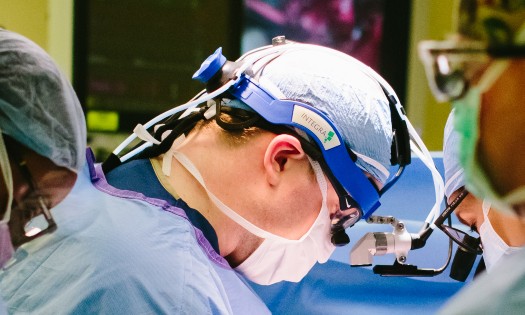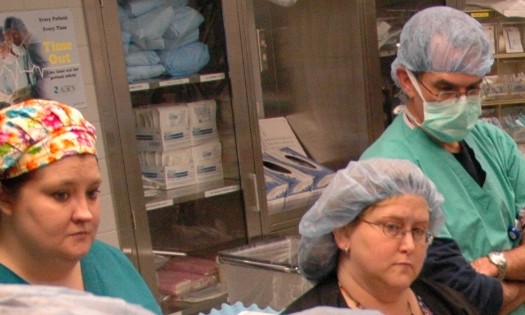The Innovation: A Valve That Becomes the Patient’s Own Tissue
A new implantable valve by Xeltis could be a step toward a long-awaited breakthrough: A synthetic valve that is gradually replaced by a child’s own cells and tissue. If the device lives up to its early promise, it will grow as the patient grows. This, in turn, will reduce the number of repeat replacement procedures and may reduce the infection risk associated with certain types of “animal valves” which have been used in the past in this application.
Children's Health Medical Center Dallas, part of Children’s Health℠, is the only center in the Southwest participating in a pivotal clinical trial of this innovative valve. Our surgeons implanted the first three Xeltis valves in the nation, with promising early results.
The Big Picture: Working to Prevent Reinterventions and Infections
Robert Jaquiss, M.D. and his team at the Children’s Health Heart Center have spent their careers facing a dilemma: They can use human, animal or mechanical valves to replace a malformed or malfunctioning pulmonary valve in a patient, but those replacement valves aren’t durable, they don’t grow, and animal valves can open the door to infections. Some patients need as many as five re-interventions to replace the valves by the time they reach adulthood.
“It can be miserable for these families to know that at some point in the future, their doctor is going to say, ‘it’s time for another open heart surgery,’” Dr. Jaquiss says.
The Xeltis valve marks progress toward what Dr. Jaquiss calls the ‘holy grail’: A heart valve that is durable, grows with the patient, and may not require replacement for many, many years. The Xeltis valve is designed to provide a home for patient’s cells and tissues to migrate into, triggering a process that leads to endogenous tissue restoration – and, potentially, a living valve that stays healthy and efficient long-term.
Key Details: A Promising Clinical Trial
Early outcomes from two small European studies of the valve were published in Frontiers of Cardiovascular Medicine (PMID: 33748192). The first study revealed an issue with the valve’s leaflets that led to severe pulmonary valve regurgitation (PI) in several patients. This issue was corrected by an updated version of the valve that was used in the second study and is being offered at Children’s Health. Overall, 17 of 18 patients receiving the earlier version of the valve in the studies showed no progressive stenosis, dilation or aneurysm formation. None of those 17 patients needed reintervention during the study period, which covered the first year after implantation. These results led the FDA to approve a clinical trial of the valve.
The trial is being offered at six sites in the U.S. and three sites in Europe. Children’s Health is the only site in Texas and the Southwest.
To be eligible, patients must be under age 22 and need one of the following:
Placement of a valve in the pulmonary position, termed the right ventricular outflow tract (RVOT)
Replacement of previously implanted pulmonary homografts or non-mechanical valves
A Ross procedure, where the Xeltis valve would replace the patient’s pulmonary valve – which would then be used to replace the aortic valve.
Dr. Jaquiss and his Children’s Health colleague, Ryan Davies, M.D., implanted the trial’s first three valves. All of those were used to replace malfunctioning donor or animal valves. “So far, the Xeltis valve is working very well and there have been no signs of infection, but it’s still very early,” Dr. Jaquiss says.
Children’s Health Heart is among the busiest centers in the nation, and Dr. Jaquiss estimates that our team performs 15 to 30 surgeries per year where the new valve could be used, if it ultimately proves effective. He also notes that the valve doesn’t have to be perfect to be a success.
“If the Xeltis valve performs as well or better than our current options and has fewer infections than an animal valve, it’s a ‘win’ because it would be ubiquitously available – we wouldn’t be constrained by the availability of donor valves,” Dr. Jaquiss says.
Why Children’s Health? Access to Innovations That Improve Outcomes
The clinical trial marks more progress in our quest to raise the bar on heart care for children in Texas and nationwide.
“As a high-volume center, we constantly face the imperfections in our field and the limitations of even the best current care,” Dr. Jaquiss says. “That makes us even more motivated to improve – we’re always combing through the literature, attending conferences, talking to innovative companies, participating in learning networks and developing solutions.”
As part of the commitment to getting the earliest access to the most cutting-edge treatments, the Heart Center is participating in numerous trials of medications, devices and procedures.
“Referring providers choose us because they know their patients will have earlies access to new technology, access that is only available at a few hospitals nationwide,” Dr. Jaquiss says. “That, combined with our expert team, means we can give each patient the best possible opportunity for a good outcome.”
To learn more about the trial and/or make a referral, please email Robert.Jaquiss@UTSouthwestern.edu.
Learn more about innovative heart care and research at Children’s Health


